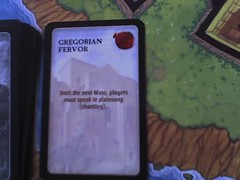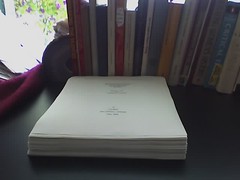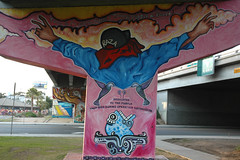My personal opinions and not meant to represent the award administrators or be any sort of official statement…
A rambling overthink:
I think “Arcana” and much fanfic should be looked at as an experimental form, or as being like artists’ sketchbooks. Sketches in art are nifty, even if the artist isn’t Davinci. As a reader and critic, I often enjoy raw, ephemeral work and find something of value in it, while I find much “professional-quality” writing to be dull, with all its quirky edges smoothed off by workshops, MFA programs, editors, the standards of market forces, considerations of literary genre, and so forth. I would rather read an ungrammatical unfinished poem of raw power that goes somewhere unusual than I would read a high-falutin’ perfectly crafted New-Yorker-ish sonnet that doesn’t say a damn thing. Both may have literary merit, and ideally, a work has all possible positive qualities (As our Tiptree winner this year, Air, does have.)
Literary standards vary widely. In an award such as the Tiptree, or in a comprehensive anthology, I believe that it is important to represent works that are good by different standards of value. A work is “good”. Good for what purpose? Good for which people?
Of course, you may read all the above and agree with it, and yet still question the jury’s decision to longlist this particular story.
What can I say? I like edge conditions, and I pushed a boundary, and a lot of people disagree with me. So, let’s talk about this and learn whatever can be learned from it, and then move on to talk about the other books and stories on the list. For example, “Little Faces” which is also conveniently online. What’s tiptroid or not about that story? How about the writing style and quality? What do we think of that?
How about “A Brother’s Price” and its gender explorations? I’d be interested to hear from people who feel like it challenged gender roles and those who feel it didn’t.
Anyway.
Objections to the longlisting of “Arcana” that I’ve read in the last couple of days include:
1. it’s fanfic and should not be eligible under the bylaws of this award, or any professional sf award
2. it’s not good fanfic of its type
3. it’s not well-written
4. it’s unfinished
5. it is not tiptroid enough. It does not expand or explore gender, but instead re-ifies traditional gender roles.
6. It is illegal because of copyright laws. The author and the award are in some kind of legal danger.
7. It is plagiarism. (I think the people who use this term are particularly unclear on what “plagiarism means. It is not plagiarism.)
8. The Tiptree jury should have more diligently gone through the body of fanfic to find more, and better, examples of tiptroid fic. IN their copious spare time.
9. It was unethical of the jury to longlist this work, because it might embarrass its author
10. The author should have been contacted and asked if it was okay to longlist her unifinished story. (By the award administrators or the jury, or me in particular.)
11. The Tiptree Award bylaws should be rewritten to exclude poor-quality writing. (I would love to see the subcommittee that writes those bylaws…)
12. Liz Henry has done something moronic. We thought she could not go lower than teh Venom Cock, but, sweet pregnant crack-smoking jesus, she has.
13. The Tiptree award is annoying and run by feminist cranks who should not be taken seriously by any rational human being or writer of Quality. They might have once had a shot at legitimacy in the Real World, but now they’ve blown it. How embarrassing!
Pantryslut, a former Tiptree juror, rolling her eyes at the kerfluffle:
1) You’re allowed not to like things on an awards list. 2) The processes of even awards you like and respect are not without flaw or question. 3) I think there is a misunderstanding of the nature and purpose of the long list happening.
Vito-excalibur and commenters continue to wish that the story were a better representative of fanfic in general.
Matociquala’s journal has an extremely lively discussion. In it, the predominant threads are not questioning the value of fanfic in general, but focus on the Tiptree Award’s process of gathering nominations. Cija comments:
I think the inclusion of fanfic, especially dirty, self-indulgent fanfic, in the Tiptree longlist (or shortlist, or the award itself) is a fine fine idea, although judging from the quotes you provide, this one doesn’t seem to be notably dirty or self-indulgent. Too bad.
In particular, I thought it was interesting that there was a perception of the story being the uninformed choice of a well-meaning outsider to the genre of fanfic… or maybe it would be more accurate to say the fanfic communities. (That earnest yet clueless outsider would be me (according to them… a lot of assumptions about how much of an outsider I am). More about this further down in this post.)
Am I an expert on fanfic? No. Have I ever read it? Yes. I’m not strongly part of any fanfic community, but I’ve read it a little here and there. I have even written it, though mostly badfic. I particularly loved the old “pottersues” community and its hilarious snarkiness. Might there be fanfic out there, mpreg fanfic, that everyone would hail with as Tiptroid and literary enough ? Hell yeah… Please nominate it asap!
About legality: I think this is bunk. I don’t think about whether a story is “illegal” or not when I read it. Do people think that if there were censorship laws, that awards should not consider that kind of illegality? So, “free speech” is one thing when it’s about a nation or a government… but another thing that we should respect when it’s a corporation who “owns” an idea? What are people really worried about here? Last time I checked, fanfic writers were not being sued or thrown in jail… nor were they smashing the state or destroying the idea of intellectual property or sucking away the hard-earned dollars of authors starving in garrets… And the existence of the fanfic doesn’t make people not read or watch the original/”owned” stories. At most, they might be sent a cease and desist letter which they could then put up on the Chilling Effects site which is part of some great legal efforts to fight that kind of atmosphere. About plagiarism: hahaha. Give me a break. Then go look up the dictionary definition of “plagiarism”.
Moving on from there.
Then we get into the nitty gritty of what the story does and whether it’s tiptroid or not (which is hard to talk about, since everyone has a different idea of what “expanding and exploring gender” means.)
Back for a moment to the idea of being Tiptroid, and “good”… Tiptroid for whom?
Am I demanding stuff that expands *my* concept of gender? Or what I think and percieve as “most people’s” ideas of gender, or even “my idea of sf fandom who might be interested in the Tiptree’s ideas of gender?” It turns into a lot of doublethink very quickly. And I wanted very much to avoid any sort of “more genderfuck than thou” chest-beating on the jury.
Okay, so, back on matociquala’s journal, I said:
Once the story gets past the set-up and the rape scene, there’s lots of detail about a macho guy’s response to being pregnant. Nick’s sudden vulnerability, loss of independence, and the changes he goes through were interesting. Snape’s “protective father/husband” responses were really weird because of the (former) macho-ness of Nick.
katallen, cija, and others get quite deep into the issues. Katallen questions whether it’s an mpreg at all, since Nick is “really” a hermaphrodite and has been all along, and knew it, and so did Snape and the Ministry of Magic. (Though I would add that Nick was in denial about it for most of his life.) “The macho image is shown to be a fraud — and so a macho guy’s reaction to being pregnant is never explored.” She adds, “it didn’t feel gender expanding so much as gender conformist… However much Nick hides or denies it, the sex that gets pregnant is there to be made pregnant, to bear children, and (once a feminine side is exposed) will be lusting after sex with their rapist, crying every five minutes because of their hormones, and need a real man to get them safely through pregnancy.”
cija says:
there are ways to wallow in illicit fantasy without making the narrative defend the essential rightness of the false construct, if that makes any sense. I am all for the wallowing, but not so much for the embedded defense. It is tricky to do the one without the other, but vastly preferable.
Yowza, cija, if I were a man, I’d be begging you to let me have your babies. I still disagree, but there you articulated the exact location of the problem and point of disagreement.
and katallen again:
I don’t read a lot of slash fic, but enough to have met dozens of stories where two masculine characters, subsequent to sex or falling in love, gradually morph into a het couple — with the smaller/prettier/smarter of the two men taking up the feminine role (homemaking, sexual jealousy, physical and emotional dependance etc)
Coffeeandink made some cogent remarks and gave a link to thasallia’s post on how distinctive characters are often transformed in fanfic into more conventional roles (wow, I loved this post…):
But, getting back to flipping gender expectations, I can think of several body-swap fics in FS fandom that do a lovely job of this, but I also think there have to be other gen or het fics that do a good job of showing how gender isn’t the easy assumption that we tend to make it. And how are we defining gender roles anyway? How are we coding male and female these days? One of the reasons I rarely read slash is because I have little interest in seeing a masculine character feminized, in more than the subtle construct way (i.e., I don’t want to see John Crichton act like a girl except for in the, “Shit, the whole way I look at the world is suddenly reversed and I’m getting my ass kicked by a girl” kind of way.) I’m not interested in that sort of coding between men, but again, that’s my personal preference. However, again, that whole reversal of gendered expectation is interesting and I wonder (not reading a lot of femslash), if a similar thing happens there. Does one of the women become “the man” in the story?
Katallen says:
…what interested you wasn’t examining how a man would cope with pregnancy but the reactions of a Western middle-class female who is secure in her equality and her personal relationship to her gender (75% of the world’s population are still chopping wood and carrying water by three months and never aren’t met with sexism) having to cope with a new image, that’s imposed both by her own biology and societal reactions to pregnancy and motherhood.
So, the more sophisticated slash and fanfic readers read Brunson’s Nick as a very typical-for-fic manly man who is feminized. Nick’s weepiness and girliness and moments of vulnerability perhaps annoy, because they seem to reify this particular gender stereotype. Now, I don’t like that stereotype either! And yet I know many strong, independent women who get pregnant and then start falling into many stereotypical roles. As I pointed out somewhere on the many-tentacled thread on matociquala’s journal, this is a common theme of mommybloggers. “How did I get here? What’s going on? What the hell just happened? How can I get my life as an independent person back?” Nick seems to me to react similarly. Coded as a man’s reaction, that “wtf!” reaction can be seen as interrupted entitlement. Which exposes the interrupted entitlement that some women, raised to expect some measure of equal rights or gender-blindness, experience. I found that interesting, and I still do! Is that because I’m a United Statesian upper-class mom and housewife? Gosh… um… probably. However, I am not in ignorance of feminism, world politics, women who live in poverty, and class differences in general.
There was also a strand of people saying that I in particular (because I said in public that it was me who pushed to longlist “Arcana”… (and I said it in public because I felt I had to, since half the people reading already suspected it was me and were making coy statements to indicate it, and because of needing to stand up and defend my judgement and the story’s author, and also out of consideration for the tender feelings of my fellow Tiptree jurist, who seems eager to distance themself from the OMG Not Literary Enough works on the list) ummmmm where was I?) People saying that I was an outsider to fanfic. Such as….
katallen:
…an external advocate who doesn’t appear to be comfortable that they have a grasp of what’s a typical or representative product from the community they’re trying to gain attention for. (Rather like a missionary displaying poor quality domestic pottery when he could, at least, be showing what they trade with the tribe next door.)
and elisem:
What it easily can slip into being is condescending. Not saying the nominator in this case meant to condescend, but the missionary aspects of this…
This seems to me like a valid criticism. Well, since I have no professional status in anything particularly, and no vested interest in pretending that I’m a big expert and infallible, why should I not realize this fairly instantly when it’s pointed out to me, and try to respond? And actually, I think about this kind of issue a lot, since I deal with problems of cultural appropriation both as a feminist and as a translator. I had not thought of being an outsider and of perceived condescension in this context. I did make some effort to learn and ask about fanfic communities, as I also asked around about tiptroid SF in non-English languages, and about other genres like comic books. (I actually nominated the comic book “Y: The Last Man” to that end. ) In retrospect, I did not make ENOUGH of an effort for the ambition to push the award’s parameters a little further out. In my defense, I did put quite a lot of effort into it, and into the Tiptree Award as a whole, and overall, I think we all did a good job. It was an amazing education, the entire process.
(Slightly more defensiveness: I can’t know everything about everything, but you know… I do know a hell of a lot about SF and about literature in general, and… (back to the comment made by katallen about class and feminism and women-chopping-wood) actually I am particularly well read in world literature in general, across a broad time span. This, at least, helps me be confident of my own critical judgement having a *very* broad base to draw upon. People who don’t know me personally might not know this, and I tend to get treated like I’m a ditz, and about 20 years younger than I am, and I have found a generally suspicious attitude from some hard-core SF fans who think I have not been fannish enough, or something, because I did not go to Whatevercon for a bazillion years and don’t get their filk jokes. Er, whatever… blow me… Actually I’ve gotten both the “Britney-Spears-listening teenybopper bubblegum-popping ditz” and the “romance-novel-reading men
opausal crazy cat lady” judgements… make up your minds already… which is it? Oh, nevermind, I am large, I contain multitudes… )
(And a side note about comics: as I continue reading them I have developed a fascination with The Hulk, especially Peter David’s work. And I think The Hulk does some amazing explorations of masculinity. The thought of explaining this to a Tiptree jury gives me hives, frankly… Hahahaha… Grimjack is also very cool. But anyway, I love comics now and am looking forward to a lifetime of reading more of them! )
As for the unfinished-ness and roughness, or rawness, of the story: this seems to me comparable to conversations about blogging. Blogging is its own genre. Its literary standards are not the standards of mainstream literature. I maintain that the rawness is part of it: You can blog as if you’re writing a magazine article,but then you’re just writing a magazine article. The experential quality of a blog is important, and its development, its immediacy. It is the exposure of process. It is a little bit like, it’s part of a very intense conversation. A magazine article is a polished monologue. A blog entry is an offered bit of conversation, offered in a way not always possible in face to face life. (And, it woudl be interesting to explore the idea of intimacy, trust, exposure, intimate conversation and ideas people have about pillow talk, in this context.) People engage with blogs like they do with conversations. Now in some ways we think of all textual interaction as conversation. Intertextuality is the history of conversations. But blogs depend on that idea, and push it further, and we don’t really understand what it’s doing or how it works or what that means yet. Fanfic has something similar going on, and no, I am not super qualified to talk about that, but from my seat over here in a somewhat analogous country, I’m waving in recognition. A group production, a community involvement in the production… and absolute exposure of that as a process.
*deep breath* *realization of giant digression*
*** Oh yeah, and also I should link up to Nick Mamatas and commenters – but I haven’t read any of that yet. I’m sure there’s a lot of meanness but also a lot that’s funny in there. At least he has the grace to make fun of the entire Tiptree award, instead of just one author, or me in particular.
It is kind of tempting to do a close reading and mockery of particular badly-written or quirkily-styled sentences from ALL the other Tiptree winners… because you know, that is something that I could easily do. All of them. I love parody, so why not apply it across the board, to make it less of a cheap shot?
***
The comments in juliansinger‘s journal are also interesting. I try to look past the “Liz is condescending” bits… which I have tried to answer, defend myself a little bit, and learn from… But you know, as if I need special lessons about queer feminist lit, and otherness? How can I help feeling a bit defensive!
***
Anyway, as I kept reading thassalia’s commenters… and then branching out into their journals (omg, I love the web…) I came across stuff like alara_r’s analysis:
If the body parts are girly, it isn’t manslash. 🙂 If the characters know they have been switched, I am more likely to describe it as “genderfuck”, because there you get a quasi-slash dynamic where Still Guy A *knows* Former Guy B used to be a guy, but now he’s a girl, so the body parts are het but the minds are slash. However, the femslash was femslash because it was a universe where the characters were born women rather than men, so they had no reference point to understand themselves as men, though we the readers knew.
Can I just say again that I think that the theorizing about gender here is great and fascinating? A tip of the hat? Without being accused of being condescending, can I admire and enjoy this discussion? Can we get thassalia or some of these very knowledgeable people as Tiptree jurors? That would be excellent!
Here is a key thought: In order to *get anywhere deep* in discussing why a work is gender-expanding or exploring, you have to : a) talk about your own gender b) talk about your own sexuality and what makes a work “good” for you… jouissance is in many ways about sex. That is part of why these discussions are difficult for some people, perhaps.
And the goal, as I see it, of the Tiptree, and of many feminist endeavors, is to make space for difficult conversations.
For anyone who has gotten through this rambling brain dump… I don’t have time to make it pretty right now … In the interests of transparency and bloggishness, I’m just trying to be as honest as possible and put some ideas out into the world.
Feel free to trash me and my judgement, and make fun of me some more. *sicilian hand gesture* But lay off of the story’s author, okay?
I should do a close reading of some sections of Arcana, and try to show exactly what it was I liked about it.
I liked this comment on Em’s work, from one of her longtime fans:
I’ve been in fandom for a long time, long before the internet in fact. I was absolutely thrilled to see your name listed on the Tiptree Award long list. I remember having to re-read it several times to be certain that it was really you. You have no idea how thrilled I was to see a fanfic from you listed there. It made my day.
and this one:
i don’t really know what we’re talking about, but there are people in fandom who haven’t heard of em brunson?
And I agree with Schnaucl and her commenters. I hope that Em puts her fic back up, and I look forward to reading more of her stories… the crackfic and also published work if that’s where she goes with it in future. I thought her writing was fabulous, entertaining, funny, and thoughtful, and again, I stand by my longlisting of it. Yes, I know (and knew) it was an in-jokey crackfic in answer to a specific community’s challenge… and I thought that was fucking cool.
***
*************
People have suggested the following sources for slashy, possibly tiptroid fanfic:
Amanuensis – LJ
We Read Crap So that You Won’t Have To
from cofax7:
There are best of lists all over the net. They’re call recommendations sites. Google “Bright Shiny Objects” or “Polyamorous Recommendations” and you’ll find a ton of worthy fiction, of the slashy and non-slashy kind.
The sidebars of those sites look very intriguing.




